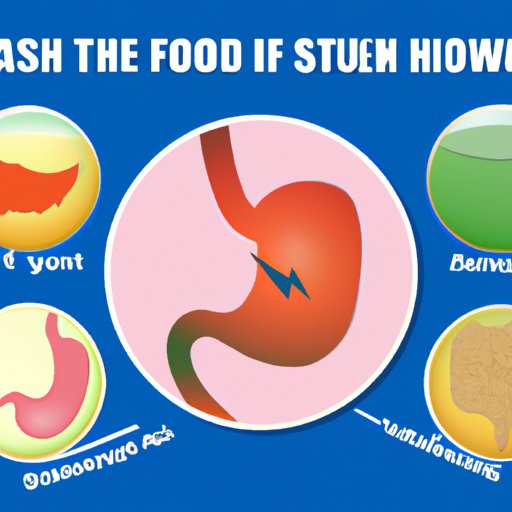
Introduction
Stomach flu is a commonly used term that refers to viral gastroenteritis, an infection that causes inflammation and irritation of the stomach and intestines. Although the condition is self-limiting and typically lasts for a few days, it can cause a range of uncomfortable symptoms that can disrupt everyday life. In this article, we will explore the symptoms of the stomach flu, including how to recognize them, treat them, and prevent the spread of the virus.
Everything You Need to Know About Stomach Flu Symptoms
The stomach flu is a highly contagious infection that spreads via contact with contaminated surfaces, food, or water. The infection typically manifests between 24 and 48 hours after exposure, and the symptoms can last for several days.
When it comes to symptoms, there are a few key signs to look out for, including:
- Nausea and vomiting
- Diarrhea
- Stomach cramps
- Fever
- Headache
- Body aches
These symptoms can be mild to severe and can vary from person to person. In some cases, symptoms may not appear at all, making it essential to take the necessary precautions to avoid infection.
If you or someone you know is experiencing any of the above symptoms, it is crucial to seek medical attention immediately. While the stomach flu is not typically life-threatening, severe cases can lead to dehydration, which can be dangerous if left untreated.
Recognizing Symptoms of Stomach Flu: What to Look For
As mentioned, common symptoms of the stomach flu include nausea, vomiting, diarrhea, and stomach cramps. These symptoms can come on suddenly and may persist for several days, making it difficult to carry on with everyday activities.
In addition to the symptoms discussed above, it is not uncommon for individuals with stomach flu to experience:
- Fever
- Headache
- Dehydration (feeling thirsty with dry mouth, sunken eyes, decreased urine output, strong urine odor)
- Lightheadedness, weakness, or dizziness
It is worth noting that not everyone with stomach flu will experience all of these symptoms. Some individuals may have mild symptoms, while others may experience more severe symptoms that require medical attention.
Stay Ahead of the Game: A Guide to Identifying Stomach Flu Symptoms
It can be challenging to differentiate the stomach flu from other illnesses such as food poisoning or the flu. However, there are a few key differences to look out for.
First, stomach flu symptoms appear suddenly, while symptoms of food poisoning tend to develop more gradually. Additionally, the stomach flu typically causes vomiting and diarrhea, while food poisoning is more likely to cause digestive problems like stomach pain and cramping.
When it comes to the flu, both illnesses can cause fever, headache, and body aches. However, the flu is a respiratory illness that includes symptoms like coughing, congestion, and sore throat.
Factors that may make you more susceptible to contracting stomach flu include:
- A weakened immune system
- Living or working in close quarters with others (e.g., nursing homes, daycares, schools)
- Traveling to areas with poor sanitation
- Consuming contaminated food or water
To minimize the risk of getting sick, it is essential to take preventative measures such as frequent handwashing, avoiding close contact with sick individuals, and properly cooking and handling food.
Understanding Stomach Flu Symptoms: How to Tell if You’re Infected
Stomach flu symptoms can affect anyone, from infants to the elderly. In children, symptoms can be more severe and may include:
- Decreased appetite or refusal to eat or drink
- Infrequent urination/less wet diapers than usual (in infants)
- Lethargy and irritability
- Constipation
- Blood or mucus in stools
- Depression (in older children)
If you suspect that your child has stomach flu, it is essential to monitor them carefully and encourage them to drink plenty of fluids to stay hydrated.
For adults, treatment typically involves resting, staying hydrated, and consuming light, easy-to-digest foods such as broth, toast, or crackers. Over-the-counter medications such as anti-diarrheals and pain relievers may also help alleviate symptoms.
When recovering from the stomach flu, it is essential to avoid contact with others and take preventive measures to avoid spreading the virus, such as frequent handwashing and disinfecting surfaces.
Don’t Let Stomach Flu Sneak Up On You: Symptoms to Watch Out For
As mentioned earlier, not everyone with stomach flu will experience severe symptoms. In some cases, individuals may have milder symptoms that do not prompt them to seek medical attention.
However, it is essential to be aware of warning signs that may indicate a more serious condition, such as:
- Intense stomach pain or swelling
- Blood in vomit or stools
- Difficulty breathing or shortness of breath
- Confusion or disorientation
If you experience any of these symptoms, seek medical attention immediately.
Conclusion
Stomach flu can be an uncomfortable and disruptive condition, but it is possible to manage symptoms and take preventative measures to avoid infection. If you suspect that you or someone you know has stomach flu, it is essential to recognize the symptoms and seek medical attention if needed.
By taking care of yourself and following proper hygiene and sanitation practices, you can minimize the risk of getting sick and ensure a swift recovery.




